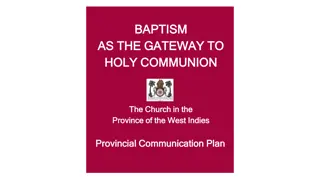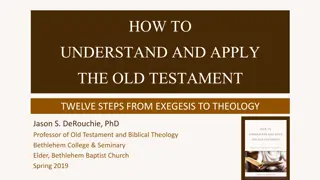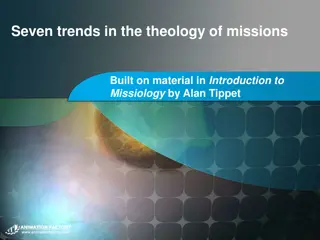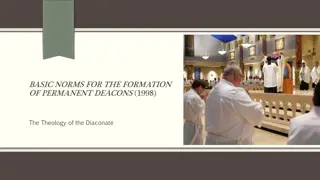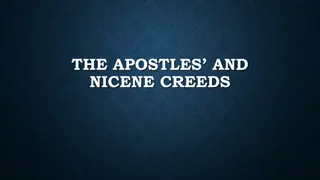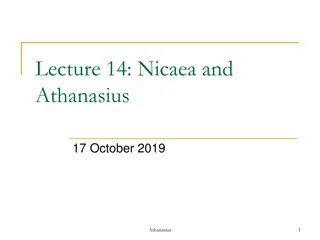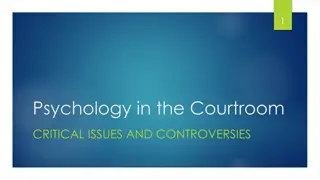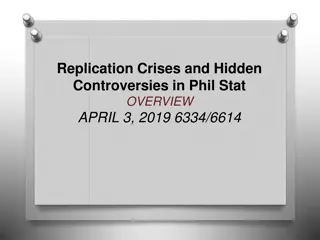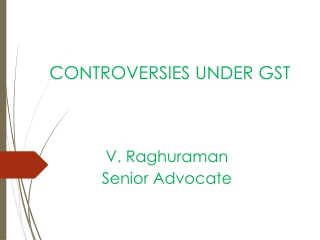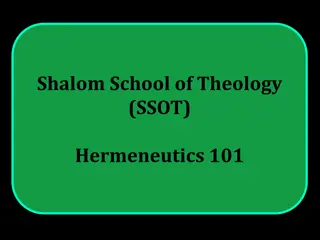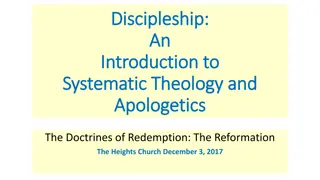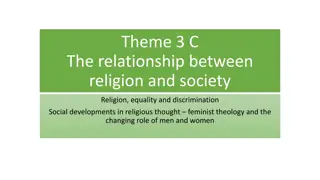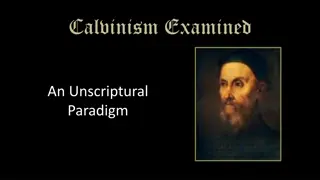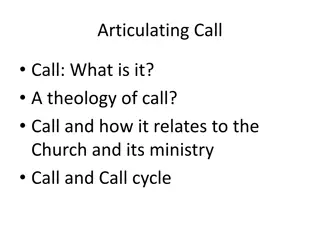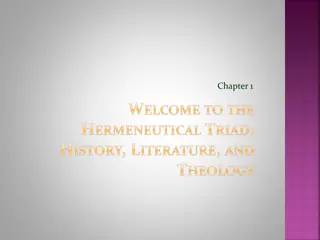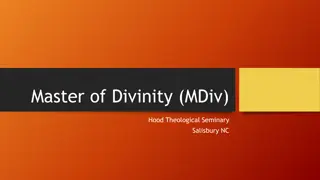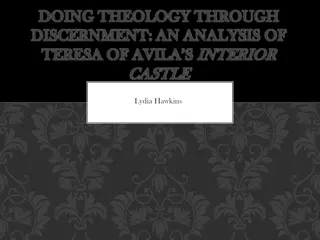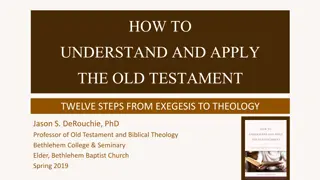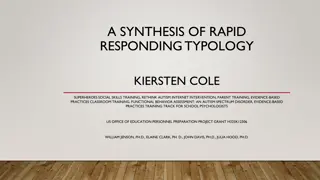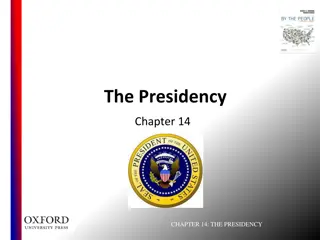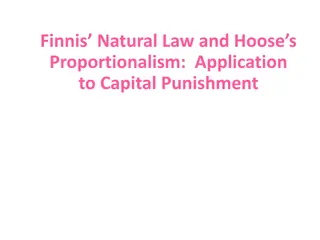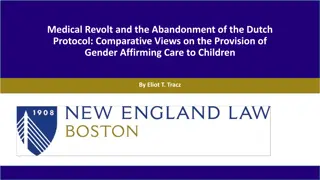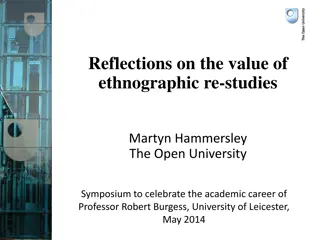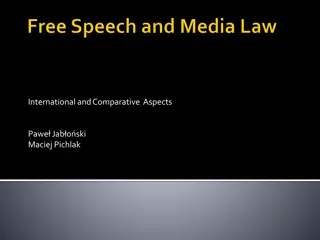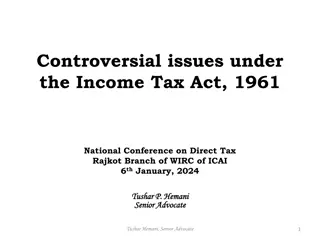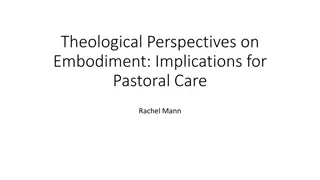Sacramental Theology: Historical Perspectives and Controversies
The discussion delves into the dispute between Donatists and Augustine regarding the validity of sacraments, focusing on the efficacy of sacraments ex opere operato and ex opere operantis. It explores the theological implications of sacraments as instrumental causes of grace, referencing the views of Augustine and the Council of Trent.
Download Presentation

Please find below an Image/Link to download the presentation.
The content on the website is provided AS IS for your information and personal use only. It may not be sold, licensed, or shared on other websites without obtaining consent from the author. Download presentation by click this link. If you encounter any issues during the download, it is possible that the publisher has removed the file from their server.
E N D
Presentation Transcript
Miyon Chung APBF Theological Education
Historical Context Donatistsheld that Caecilian s consecration was invalid because 1 of the 3 bishops who consecrated him was a traditor. Content: Mystery of the sacraments Augustine s Response: The validity of the sacraments entirely depends on Jesus Christ not on the merits of those who administered them. The right to baptize exists only within the church (proper successors of the Catholic church)
Two Latin Slogans (McGrath, 406) 1. Sacraments are efficacious ex opereoperantis literally, on account of the work of the one who works. Here, the efficacy of the sacrament is understood to be the outcome of the personal qualities of the minister. (Donatist) 2. Sacraments are efficacious ex opereoperato literally, on account of the work which is done. Here, the efficacy of the sacrament is understood to be the outcome of the grace of Christ which the sacraments represent and convey. (Augustine, Innocent III (1160-1216))
ex opereoperato (from the work worked) in virtue of the action refers to the grace-conferring power inherent in the sacramental rite itself, as an action of Christ used of a sacrament considered independently of the merits of the minister or the recipient ex opereoperantis (from the work of the doer) in virtue of the agent refers to the role and value of the recipient's or minister's moral condition in causing or receiving sacramental grace used of a sacrament considered in relation to the conditions required for its valid administration or for its worthy reception
Ex Opere Operato (The Council of Trent) from the work performed Describes how the sacraments confer the grace they signify. Grace is alwaysconferred by a sacrament, in virtue of the rite performedand not as a mere sign that grace has already been given, or that the sacrament stimulates the faith of the recipient and thus occasions the obtaining of grace, or that what determines the grace is the virtue of either the minister or recipient of a sacrament. Provided no obstacle (obex) is placed in the way, every sacrament properlyadministeredconfers the grace intended by the sacrament. In a true sense the sacraments are instrumental causes of grace. "That grace is not conferred ex opere operato by the sacraments of the New Law (https://www.catholicculture.org/culture/library/dictionary/index.cfm?id=3347 4)
ex opere operato (Trent interpreted) The historic Roman Catholic view of the way sacraments are effective is that they operate ex opere operato ("from the work done").This position became official at the Council of Trent (1545 - 63). Canon VIII of the seventh session opposed the view that "grace is not conferred through the act performed, but that faith alone in the divine promise suffices for the obtaining of grace." The condition for the recipient is only that one does not place an obstacle (obex, sinful act or disposition) against the sacrament's administration. Grace is given by God when the sacrament is conferred rightly by the church.This ex opere operato working makes the sacraments unique conductors of divine grace. This does not mean, however, the disposition of the recipient is not considered at all. To benefit from their spiritual fruit, must be properly disposed.
Reformers on ex opere operato Rejected the notion The sacraments are grounded in the word of God (objective dimension) Faith is required for efficacy (subjective or personal dimension) What about infant baptism?
Benefits of the Sacraments McGrath Sacraments convey grace (causa sine qua non) RCC Sacraments strengthen faith Luther & Vatican II: Sacraments enhance unity and commitment within the church Cyprian of Carthage, Augustine, Luther, Zwingli Sacraments reassure us of God s promise to us Luther, Calvin
Baptism http://freenorthcarolina.blogspot.com.au/2014_09_09_archive.html
Romans 6:1-11 1. What shall we say, then?Shall we go on sinning so that grace may increase?2By no means! We are those who have died to sin; how can we live in it any longer?3Or don t you know that all of us who were baptized into Christ Jesus were baptized into his death?4We were therefore buried with him through baptism into death in order that, just as Christ was raised from the dead through the glory of the Father, we too may live a new life. 5For if we have been united with him in a death like his, we will certainly also be united with him in a resurrection like his.6For we know that our old self was crucified with himso that the body ruled by sinmight be done away with,that we should no longer be slaves to sin 7because anyone who has died has been set free from sin. 8Now if we died with Christ, we believe that we will also live with him.9For we know that since Christ was raised from the dead, he cannot die again; death no longer has mastery over him.10The death he died, he died to sinonce for all;but the life he lives, he lives to God. 11In the same way, count yourselves dead to sinbut alive to God in Christ Jesus.
The Westminster Confession (1646) I. Baptism is a sacrament of the New Testament, ordained by Jesus Christ, not only for the solemn admission of the party baptized into the visible Church; but also to be unto him a sign and seal of the covenant of grace, of his ingrafting into Christ, of regeneration, of remission of sins, and of his giving up unto God, through Jesus Christ, to walk in the newness of life. Which sacrament is, by Christ's own appointment, to be continued in His Church until the end of the world. II. The outwardelement to be used in this sacrament is water, wherewith the party is to be baptized, in the name of the Father, and of the Son, and of the Holy Ghost, by a minister of the Gospel, lawfully called thereunto. III. Dipping of the person into the water is not necessary; but Baptism is rightly administered by pouring, or sprinkling water upon the person.
IV. Not only those that do actually profess faith in and obedience unto Christ, but also the infants of one, or both, believing parents, are to be baptized. V. Although it is a great sin to contemn or neglect this ordinance, yet grace and salvation are not so inseparably annexed unto it, as that no person can be regenerated, or saved, without it: or, that all that are baptized are undoubtedly regenerated. VI. The efficacy of Baptism is not tied to that moment of time wherein it is administered; yet, notwithstanding, by the right use of this ordinance, the grace promised is not only offered, but really exhibited, and conferred, by the Holy Ghost, to such (whether of age or infants) as that grace belongs unto, according to the counsel of God's own will, in His appointed time. VII. The sacrament of Baptism is but once to be administered unto any person.
Early Teachings on Infant Baptism Everett Ferguson Irenaeus (Against Heresies) refers to baptism in relationship to regeneration and gives a witness to the practice of infant baptism. His language, however, does not endorse concrete baptismal regeneration or infant baptism. Rather, he speaks of both regeneration and infant baptism broadly.
Tertullian (160-220) (On Baptism) Contrasts Christian baptism and Jewish and pagan baptisms He traces the proper antecedents to Christian baptism (Gen 1:1-2, Noah, Red Sea, Moses, Christ, etc). Defends Baptism on the example of Christ and the descending of the Holy Spirit on Christ: Baptism is blessed in Christ by water. Apostles: Special exception, baptism replaced by the Lord s direct calling
Tertullian 2 Baptism presupposes faith and repentance Baptismal washing is a sealing of faith, which faith is begun and commended by the faith of repentance. We are not washed in order that we may cease sinning, but because we have ceased, since in heart we have been bathed already. . . . And so it is becoming that learners desire baptism, but do not hastily receive it. Faith is essential Repentance associated with baptism and salvation in the language of postbaptismal sin
Tertullian 3 Preparation prayers, fastings, bending of the knee, all night vigils, confession of all former sins Children sponsors needed Water: The nature of the waters, having received holiness from the Holy One, itself conceived power to make holy. i.e., use of any water will do. Mode: Triple immersion bath Pronouncement: Trinitarian
Tertullian 4 It is prescribed that without baptism no person can obtain salvation. Second washing : Baptism of blood (martyrdom) Opposed infant baptism by emphasizing the importance of a clear personal decision before baptism. He also emphasized readiness and preparation. In his view, baptising children was irresponsible.
The Apostolic Tradition Hippolytus of Rome (early 3rd c.) And first baptize the small children. And each one who is able to speak for themselves . . . , let them speak . . . . Those not able to speak for themselves, let their parents or another one belonging to their family speak for them. Afterwards, baptize the grown men, and finally, the women . . . . Accommodation to children is a secondary development
Origen (d. 254) Against those who claimed that infants had no sin to be forgiven by baptism, Origen argued for infant baptism. Appealed infant baptism to a tradition from the apostles. ( Matt 19:13-15, 20:1-16, eg of Joshua) Through the mystery of baptism, the stains of birth are put aside. For this reason, even small children are baptized. For unless born of water and the Spirit one cannot enter the kingdom of heaven. HomiliesonLuke 14.5 (Luke 2.22), translated into Latin by Jerome
Cyprian (d. 258) Like Origen, associated infant baptism with infant sin, though not directly connects it with the stain of childbirth. His emphasis is on Adam s sin that brought the inheritance of physical death to his descendants. So, we should not attribute the doctrine of original sin to him. In the context of Decian persecution, he warns about the fate of the children who were carried into the sinful acts of the lapsed parents. He writes about infant baptism as well as infant communion.
Inscriptions from Catacomb Baptism: Pastor, Titiana, Marciana, and Chreste made this for Marcianus, a well-deserving son in Christ the Lord. He lived twelve years, two months, and . . . Days. He received grace on September 20 when the consuls were Marinianus and Pateernus the second time. He gave up [his soul] on September 21. may you live among the saints in eternity. (268) Impact of John 3:5 (born of water and Spirit) No common age of children s baptism No evidence of routine infant baptism Prevalence of emergency baptism: upon child s impending death
So, what of the early practice of infant baptism? (Ferguson, 377-378) 1. Jewish proselyte baptism and the solidarity of the family in ancient societies. (Joachim Jeremias) 2. A change in attitude toward children and the acceptance of a doctrine of original sin (Kurt Alan, supported by Origen, Cyprian) 3. The extension of children s baptism to baby baptism (David Wright), 4. The evidence of inscriptions: but the evidence is not convincing until late 4th century. Conclusion: Infant baptism was not the norm until the late 4th century.



